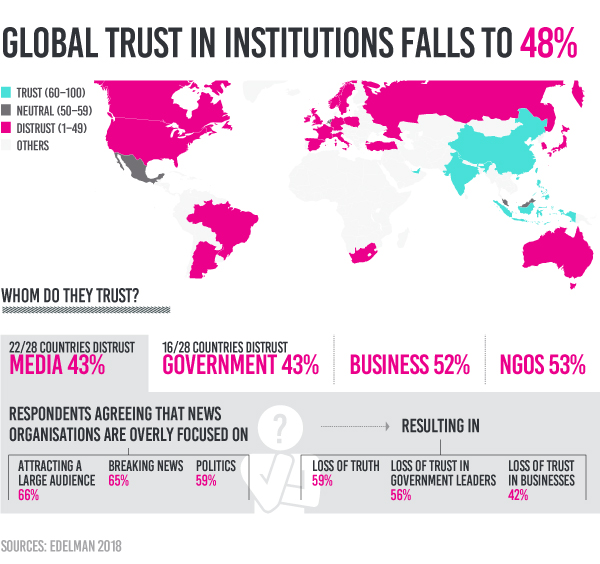![]() 5 minute read
5 minute read
People are losing their trust in institutions that are supposed to maintain the well-being of societies. This trust, however, is required for businesses and infrastructures to succeed, as it is a predictor of stakeholders’ actions. With the rise of fake news and misleading information, how will people be able to trust in the future? Blockchain may offer an answer.
Distrust in media
Recent studies have shown that trust in the media and news is deteriorating. Edelman’s Trust Barometer Global Report of 2018 revealed that only 43% of the global general public trust the media. Ogilvy, correspondingly, conducted a global media influence study, where they interviewed over 350 journalists around the world. Results showed that trust in media as a news source for professionals declined 22% from 2016. Reasons for the lack of trust in media result from media becoming increasingly business-oriented and politically biased, as well as from the rise of fake news.

Manipulated results
and false reports
Fake news has been on top of the conversation recently. Edelman revealed that approximately 70% of their study sample was worried that fake news or information could be used as a weapon. The House of Commons in the UK publicly exposed how small groups of individuals and businesses, such as Cambridge Analytica, SCL Elections and Global Science Research, have influenced elections around the world during the past years. This information has been concealed from most politicians, election regulators, as well as the general public. “We are facing nothing less than a crisis in our democracy,” the committee chair, Damian Collins says, “based on the systematic manipulation of data to support the relentless targeting of citizens, without their consent, by campaigns of disinformation and messages of hate.” The altered information that is spread threatens rational policy-making, which requires mutual trust to function.
As a solution to the threat of misinformation, four of Norway’s newsrooms have combined forces to make sure published claims are based on facts. Faktisk, is a non-profit organization that publishes the fact-checks on their website, social media and the Norwegian national news agency NTB, so that newspapers can re-use the results. On their website, each article includes the context in which a claim was made, the data and evidence that led to the conclusion, as well as the reaction from the public figure who made the claim. Faktisk shows an example of how news agencies can combine forces to ensure their trustworthiness.
Earning consumer trust
in grocery retail
Transparency of the supply chain enhances the trust of consumers, as they get to know the background of desired products. Currently, in the food market, consumers cannot follow the end-to-end food supply chain. This is, however, becoming important to access due to ethical and health issues. Food contamination incidents, for example, can take months to solve due to the complexity of finding out what has happened at each part of the supply chain. Approximately 17% of Americans get sick due to food contaminations, and taking care of these health issues costs the US 15 billion each year.
IBM has been working together with food industry leaders and innovators to enable consumers to know the transparent and accurate journey of foods they buy. IBM Food TrustTM is a collaborative network of different transaction partners that strengthens accountability along the supply chain. It is powered by IBM Blockchain Platform to connect members directly through permissions, permanent and shared record of food product related data. IBM Food TrustTM has joined teams, for example, with Walmart in order to make consumers able to see details about the food they buy.
https://www.youtube.com/watch?v=SV0KXBxSoio
No need for a third party
As much as Blockchain enhances trust, it can also remove the need for it altogether, as every transaction is visible and difficult to change. Changes can only be done with rules specified by a mathematical algorithm that requires authorization from the majority of other computers in the network. The digitally distributed ledger can report financial transactions transparently in real time, which reduces the need for traditional accounting practices to act as a third party in providing trust. According to a report by Santander InnoVentures, by removing activities of third parties, Blockchain could save banks 15–20 billion dollars annually by 2022.
Smart contracts are another way Blockchain can be used to create trust. They are built on the Ethereum platform, which facilitates executing contract terms automatically based on set rules. Smart contracts remove the need for a third party to create trust, as well as speed up the process while controlling for risks related to human error. PolySwarm is an example of a company using smart contracts in its decentralized threat intelligence marketplace. Here enterprises and ambassadors can specify a reward for the person who submits the correct assertion to a bounty. When the correct assertion is submitted, the promised funds are automatically transferred to the recipient. This allows PolySwarm to give incentives to innovations in cybersecurity in order to provide better threat protection.



